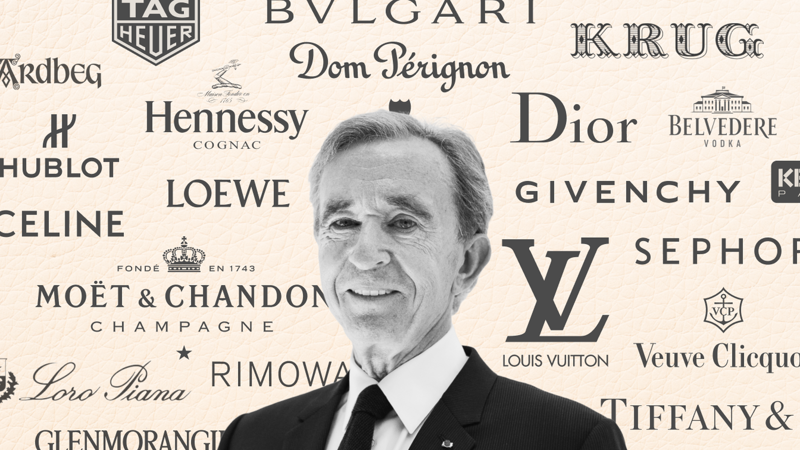LVMH is the world’s largest luxury conglomerate with dozens of brands including Louis Vuitton, Dior, Marc Jacobs, Tiffany & Co., etc. Bernard Arnault, who will turn 75 in March, co-founded LVMH in the 1980s and serves as its CEO and Chairman.

Last week, Forbes’ real-time billionaire ranking showed Bernard Arnault’s wealth at nearly $208 billion, after a nearly $24 billion increase on January 26th. Meanwhile, Elon Musk’s wealth stood at over $204 billion, allowing Arnault to surpass Musk as the world’s richest person.
However, on January 30th, Arnault’s wealth increased by $1.3 billion while Musk’s increased by $5.5 billion, swiftly reclaiming the top spot for the tech billionaire. The drama didn’t stop there. Judge Kathaleen McCormick in Delaware, USA, on January 30th, ruled to invalidate Tesla’s $55.8 billion compensation package for Elon Musk, according to Reuters.
The $55 billion compensation package for Elon Musk at Tesla has been invalidated by a Delaware judge in the US, after a shareholder argued it was unreasonably high and unfair. This ruling could “rock the boat” for Musk’s future wealth, as this stock compensation package is one of his most valuable assets. If this payment is invalidated, Elon Musk would fall to 4th place in the billionaire ranking, relinquishing the throne to the Chairman of LVMH.
Recently, Arnault and Musk have been alternating in leading the world’s richest list. Most recently, the LVMH chairman held the top spot from late 2022 to mid-2023.
While the LVMH chairman continues in the “race” for the title of the world’s richest, France’s La Lettre recently reported that Bernard Arnault plans to appoint his two sons to the board of directors of the world’s largest luxury conglomerate. Accordingly, the French billionaire wants to nominate his sons, Alexandre Arnault (31 years old) and Frédéric Arnault (29 years old), as board members. Their appointment would need approval from shareholders at the company’s annual meeting in April, but that’s largely a formality.
If the appointment goes through, four out of Bernard Arnault’s five children will sit on the board of directors of LVMH. Delphine, the eldest and only daughter, has been on the board since 2003, while the second son, Antoine, became a director in 2006.
The Business Newspaper suggests that if Frédéric and Alexandre become board members, the race for the Chairmanship of LVMH among the Arnault siblings could enter a new and intense phase. Additionally, if the plan to appoint Bernard’s two sons succeeds, the Arnault family’s position at LVMH will be further strengthened. Currently, the Arnault family holds 48% of LVMH’s shares and 64% of the voting rights.
Arnault has not publicly commented on his successor. During the announcement of LVMH’s annual financial report on January 25th, Arnault once again emphasized the “outstanding performance of the Fashion & Leather Goods sector.” Over the past year, this sector achieved total revenue of €42.16 billion, marking a 9% increase over the previous year, with noteworthy growth in both production and sales revenue of 14%.
In particular, the CEO praised two gems in the conglomerate, fashion houses Christian Dior and Louis Vuitton. Bernard Arnault commented: “These are two of the largest brands in the world in the soft luxury category (including categories such as bags, clothing, and accessories), with Chanel and Hermès being the main competitors.”
And the French businessman added Tiffany & Co. and Bulgari to the list in the hard luxury segment (a category dedicated to watches and jewelry). The heavyweight competitors these two brands face are Cartier and Van Cleef & Arpels from Richemont Group. Arnault said: “Among the strongest brands in the world, we own half of them, which is quite commendable. We will continue to see if we can expand this cooperation a bit or strengthen our other brands.”
In the conference, Bernard Arnault explained that a maximum growth rate of 8 – 10% is sufficient and even contributes to the “desire of the brand.” This change in strategy seems to indicate that the group’s profits in the coming years will slow down. He said: “We have a very high growth rate, even too high. We need to slow down a bit. The issue is not growth but the thirst of the customers.”
Furthermore, he suggested that his leading brands should produce less and invest less in marketing. “We have reached a point where such growth is no longer necessary. And I would be very happy if the growth rate could decrease.” To maintain scarcity and customer desire, the strategy they need to rely more on is product strategy rather than the volume of goods sold.
To adapt to this goal-oriented change, LVMH underwent a reorganization earlier this year. Delphine Arnault, Bernard Arnault’s daughter, was appointed CEO of Christian Dior. Meanwhile, Pietro Beccari, who previously held this position at Dior, still leads but has been transferred to Louis Vuitton. Moreover, after a decade as CEO of Louis Vuitton, Michaël Burke was appointed CEO of LVMH Fashion Group, overseeing the company’s other fashion brands.
LVMH’s revenue soared in 2023. The market capitalization of LVMH is estimated at €444 billion (equivalent to over $491 billion), placing the conglomerate in the top 10 largest companies in the world. Especially, if the figure continues to rise to $500 billion, LVMH will be the first European company to reach this milestone.


Related post
Breaking Down the Key Tactical Edgeas in the Oakland Raiders Lineup
Breaking Down the Key Tactical Edges in the Oakland Raiders’ Lineup reveals not just a football team but a storied franchise with an indomitable spirit.
The Most Heartwarming Moments of Spider Man On Screen
The world of Spider-Man is not just filled with thrilling battles and breathtaking stunts; it’s a tapestry woven with moments of profound empathy, love, and
5 Tips to Style Hoodies on Cold Winter Days
As winter settles in, many of us find ourselves reaching for cozy essentials that provide warmth and comfort. One such wardrobe staple is the hoodie.
The Truth Behind the Rumor ‘Santa Claus Is Ugly’ That Surprises Many
As the holiday season approaches, the character of Santa Claus emerges in various forms, his iconic red suit and white beard eliciting warmth and joy
Guide to Creating a Heavy Metal Sound in the Style of Tony Iommi
Heavy metal is a genre rich with history and technical prowess, and few guitarists have influenced its sound as profoundly as Tony Iommi, the legendary
Breaking Down the Key Tactical Edgeas in the Oakland Raiders Lineup
Breaking Down the Key Tactical Edges in the Oakland Raiders’ Lineup reveals not just a football team but a storied franchise with an indomitable spirit.
The Most Heartwarming Moments of Spider Man On Screen
The world of Spider-Man is not just filled with thrilling battles and breathtaking stunts; it’s a tapestry woven with moments of profound empathy, love, and
5 Tips to Style Hoodies on Cold Winter Days
As winter settles in, many of us find ourselves reaching for cozy essentials that provide warmth and comfort. One such wardrobe staple is the hoodie.
The Truth Behind the Rumor ‘Santa Claus Is Ugly’ That Surprises Many
As the holiday season approaches, the character of Santa Claus emerges in various forms, his iconic red suit and white beard eliciting warmth and joy